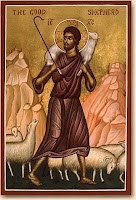Signs, Sheep, and Shepherds
By Kyle Childress
September 8, 2010
Luke 15:1-10
Our church’s logo is a shepherd’s staff, based upon the parable of the lost sheep, along with Psalm 23 and the Good Shepherd of John 10. We’ve had this shepherd’s staff with our congregation’s name written beside it out front on our sign since 1979 and it is on our letterhead, Sunday order of worship, and website. This shepherd’s staff is a constant reminder to us and to others of our vocation – who we hope to be and are called to be. More than that, it always reminds us who God is.
Our congregation began in 1968 as a gathering for lost sheep, black sheep, burned-out and beaten-up sheep, with a few old goats thrown in, as well. A lot of us were lost, but here, by the grace of the Loving Shepherd, we’ve been found. Furthermore, because of our own experiences, we have sought to make this congregation a body, or flock, where other lost sheep can find a home.
This is no small thing in today’s world. Surrounded by global capitalism, mass-marketing, big-box retailers, mega-churches with their large-scale-industrial-mass-production of Christians, and an all-too-common assumption that one needs to “get big or get out,” our church and others like us swim against a raging torrent. Shaped by Luke 15's story of the lost sheep, we believe in searching for each and every missing sheep and bringing it home; not the most efficient use of our time, not the most cost-effective, but it’s who and what we’re called to do. And when you’re the one sheep who has been lost, it is a life or death issue.
Last week at a wedding reception I had a conversation with a very talented and brilliant young woman, raised in our church, formed in part by that shepherd’s staff sign, who now teaches in the public schools of New Orleans. She teaches there because she says, “I’m called to be there.” She was telling me of the extraordinary challenges faced by the teachers and students in her part of the city and how each and every student counts. “There is an enormous difference between having 20 students or 19 students in class. When you have 19, you’re constantly worried over that missing 20th, and do all you can to find them.”
Wendell Berry’s writings are soaked in these parables found in Luke 15. His short story “Watch with Me” is a kind of extended meditation on a community watching out for a lost member with mental health problems (“Nightlife” is the nickname bestowed upon him), or as the other characters in the story put it, he had “a spell” come over him. They watch him and keep him safe until he is himself again. Toward the end of the story, still under the spell, Nightlife is in a barn, surrounded by friends who have been trying to keep him safe and he begins to preach on this very parable of the lost sheep. Berry writes, “Though Christ, in speaking this parable, asked his hearers to think of the shepherd, Nightlife understood it entirely from the viewpoint of the lost sheep, who could imagine fully the condition of being lost and even the hope of rescue, but could not imagine rescue itself.”
“’Oh, it’s a dark place, my brethren,’ Nightlife said. ‘It’s a dark place where the lost sheep tries to find his way, and can’t. The slopes is steep and the footing hard. The ground is rough and stumbly and dark, and overgrowed with bushes and briars, a hilly and hollery place. And the shepherd comes a-looking and a-calling to his lost sheep, and the sheep knows the shepherd’s voice and he wants to go to it, but he can’t find the path, and he can’t make it.’”
“The others knew that Nightlife knew what he was talking about. They knew he was telling what it was to be him. And they were moved.”
Luke 15 begins with the Religious Authorities murmuring that Jesus receives sinners and eats with them because, “The tax collectors and sinners were all drawing near to hear him,” and it is in response to their murmuring that Jesus tells these parables. But I wonder, in the first place, if the sinners were drawn to Jesus because he could imagine fully the condition of being lost? The very reason he was the Good Shepherd was because he understood entirely the viewpoint of the lost sheep and he understood them because he received them and ate with them.
Contrast Jesus and the Good Shepherd way of seeing with what John tells us about the high priest Caiaphas when he said, “Don’t you understand that it is better for you to have one man die for the people than to have the whole nation destroyed?” (John 11:50). In other words, Caiaphas and his kind say, sometimes it is okay, even necessary, to sacrifice someone or something for some greater cause: the company bottom-line, freedom and democracy, victory, efficiency, a brighter future, and on and on.
In this world of Caiaphases, the church is called to be a Good Shepherd people. And when we are faithful to our calling, then we become a sign pointing to the Kingdom of Jesus Christ, the Lord and Shepherd of us all.
